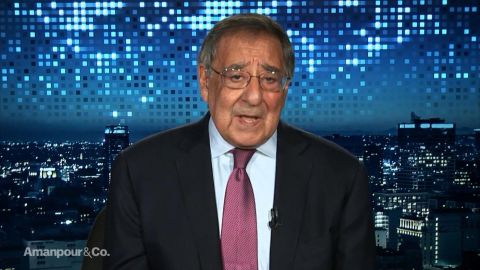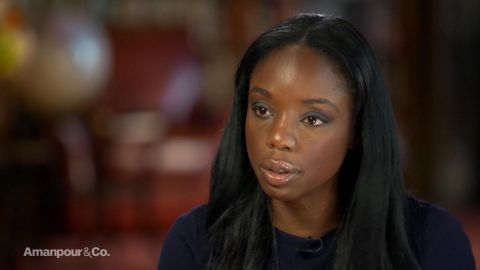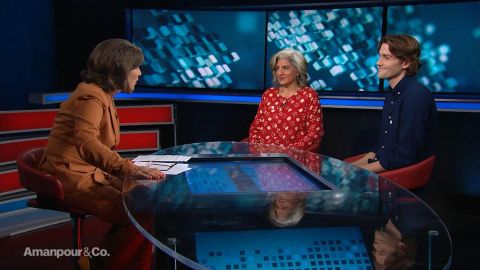Read Transcript EXPAND
CHRISTIANE AMANPOUR: Pioneering research on a different level is now finding that adversity or trauma experienced in childhood cannot only show up in the mental health of adults but it could also be harmful to physical health. Our next guest has devoted her career to that research. Dr. Nadine Burke Harris is a pediatrician. She’s the first and current surgeon general of California. And she has a new book out called “The Deepest Well: Healing The Long-Term Effects of Childhood Adversity”. She sat down with our Michel Martin to talk about it and how significantly one’s body can be shaped by all the deepest stresses of childhood.
MICHEL MARTIN, CORRESPONDENT: Dr. Nadine Burke Harris, thank you so much for joining us.
NADINE BURKE HARRIS, AUTHOR, THE DEEPEST WELL, HEALING THE LONG-TERM EFFECTS OF CHILDHOOD ADVERSITY: Thank you for having me.
MARTIN: So I’m going to start with your job. You’re the surgeon general of California. You are actually the first hold that position. So a lot of people think of the surgeon general of the United States as the person who sounded the alarm about smoking, right? I mean this is back in the day. Like I know maybe your doctor smokes but guess what smoking is bad for you. Do you have a similar kind of focus that there’s something that you really need to sound the alarm about with the public?
HARRIS: A lot of my focus is on adverse childhood experiences and the impacts that early adversity have on later life health. I see a really important role of surgeon general to sound the alarm on the public health crisis you didn’t know existed. And the single greatest unaddressed public health threat that is facing our nation today is an issue of early adversity.
MARTIN: What makes you say that? I know that this has been a focus of your work for some time now. You know your core discipline is that you’re a pediatrician. So why do you say that this is an urgent public crisis?
HARRIS: So the definition of a public health crisis is something that affects a lot of people and the effects are bad. The research on adverse childhood experience actually came from this major study that was done by the CDC, the Centers for Disease Control and Prevention and Kaiser Permanente in which they asked more than 17,000 adults about 10 categories of childhood experiences, ranging from abuse or neglect to growing up with a parent who was substance dependent or mentally ill or experiencing domestic violence. And what they found was that two-thirds of individuals had experienced at least one of these things. And one in eight had experienced four or more of these things. Now, if you’ve experienced four or more adverse childhood experiences, your risk for heart disease, the number one killer in the United States of America is more than double. For cancer, it’s also more than double. For chronic lung disease, it’s triple. For depression, it’s four and a half times. For Alzheimer’s, it’s 11 times. You’re at risk for 8 out of 10 of the leading causes of death in the United States of America. It’s dramatically increased. That meets the criteria for a public health crisis. It affects a lot of people and the effects are really significant.
MARTIN: What is it that drew that connection for you? I mean, did you have a eureka moment?
HARRIS: I sure did. So my experience was when I finished my residency training at Stanford, I wanted to go and work in a place where I felt I was needed. And so I opened a clinic in a very low-income under resourced neighborhood of San Francisco. And my goal was to address health disparities, right. We see unequal outcomes and vulnerable communities and my goal was try to improve those outcomes. And as I was seeing my patients over and over again, what I saw was that my patients who had experienced significant adversities like having a parent who was substance dependent or mentally ill or who had experienced abuse, that their health outcomes were significantly worse than my patients who hadn’t experienced that. And having a background doing training in public health, what we learn is that if you’re a doctor and a hundred people drink from a well, and 99 percent of them get sick, you can write that prescription for doze after doze of antibiotics or you can ask that question what the heck is in this well? And so that background in public health drew me to dive into the research to understand, wait a minute, why am I seeing — what is bind this connection between early adversity and all of these kids I’m seeing with asthma and ADHD and autoimmune disorders, right. And that’s what lead me to this groundbreaking research from the CDC and the field of research.
MARTIN: Some people might hear you say that and think, well, really, what you’re talking about is poverty.
HARRIS: No. So this CDC study, this adverse childhood experiences study, it was done in a population that was 70 percent Caucasian, 70 percent college educated. All of them were privately insured. They were all members of Kaiser, right. And it’s funny because I think that our implicit association with these negative health outcomes and poverty is kind of what I think allowed us for so long to overlook that there may be a biological link between adversity and poor health outcomes.
MARTIN: Wealthy kids can experience these things and have adverse experiences? Kids without resources. It’s not race specific? You’re saying it’s not specific to any group. It’s everybody?
HARRIS: It’s basic human biology. And the thing about this, we have to recognize that just as the invention of the microscope allowed people to recognize oh, you know what, infection isn’t caused by foul airs. It’s actually caused by these little critters and we couldn’t see them before because we didn’t have a way of seeing them. Well, now the invention of functional MRIs, genomics, potionomics, metabolimics, allows us now to measure in a way we’ve never been able to have. The impact our environments have on our biology. And so this field of science has really emerged. Largely because of these advances in technology that help us understand, oh, it’s this basic biological response. It’s your body’s stress response. And when folks are exposed to high doses of adversity, that actually changes the structure and function of children’s developing brains, their developing immune systems, their hormonal systems and even the way their DNA is read and transcribed. We couldn’t measure that before.
MARTIN: Give me an example, if you would, about some of the things that you’re talking about here and the way this plays out. I think about one from your book that stood out for me.
HARRIS: Yes.
MARTIN: There is a young woman who when you asked her mom who had asthma attacks, and you asked her mom like what are some of the triggers. She said well, I’ve noticed that when her dad punches the wall, she has an asthma attack. And just like, wow.
HARRIS: That was one of those moments that sent me looking into literature. Because when I did my residency at Stanford, they trained us on asthma triggers, right. And they said there’s pet dander and pollen and pollution and all of these things. And I did all of — I asked about of all the things on the checklist but this was a 10-year-old girl who I had to had to put her on two rounds of very powerful medications to keep her out of the hospital because her asthma was so bad. And as I sat down to ask again, OK, what are the asthma triggers that we didn’t cover, right, like, you know, I felt like I did everything that I was trained to do. And I said is there anything else that you can think of or any time that you notice that her asthma tends to act up? And she said yes, I noticed that her asthma tends to act up when her dad punches a hole in the wall. And that, for me, was, you know, my scientist brain, my doctor, researcher, scientist brain immediately asked the question, what is the biological mechanism for that link? And that’s what pushed me into the science.
MARTIN: And then how might that play out later in life? Will you say that there are actually — there’s strong evidence to suggest that this plays out in adulthood?
HARRIS: Yes. So one of the things — so I mentioned that when we experience something scary or traumatic, it activates our stress response. And our stress response, which is normal, right. This is the thing that is supposed to save your life when you’re walking in the forest and you see a bear, right. You release a ton of stress hormones and your heart starts to beat and you’re pumping the blood to your muscles so you can either run from that bear or fight that bear. That’s our fight or flight response. Now, one of the things that is a little bit less obvious is that when we activate that stress response, it also activates our immune response. Because if that bear gets you, right, you want your immune system to bring inflammation to stabilize the wound so you can live long enough to get away. And it also kind of shuts off your executive functioning. The thinking part of your brain. Because if you’re about to fight a bear, you really don’t want to be calculating the odds. So it activates the fear center and turns down the executive functioning. That’s perfectly fine if you were in a forest with a bear. The issue is, one, if we’re exposed to that too often, then that stress response can become over reactive. And the second piece is that when children, in particular, are exposed to high doses of adversity, because their brains and bodies are just developing, it actually changes their developmental trajectory. So I call it the stress thermostat. It actually kind of turns up the setting on our stress thermostat so that the way our bodies respond to stress, right, the way we’re wired to respond to stress changes. And that over active stress response becomes wired in. And the reason that that leads to such significant health problems is that then over a lifetime, right, we see increased inflammation. We see increased levels of stress hormones. And those stress hormones can lead to wear and tear on your arteries, right. That leads to the increase of cardiovascular disease. And this what we’re starting to understand now, right. These changes to the brain, immune system, hormonal system and the way our DNA is read and transcribed, these are things that are measurable even still in adulthood. Even long after people have left the stressful situation they were in in childhood because of changes to the way the body is wired.
MARTIN: I find myself thinking now about a situation that is very much in the news. I mean obviously, the gun violence a lot of young people are experiencing, people can argue about what the cause of that is or not. But the reality of it is that there are some kids in certain places that are experiencing a lot of gun violence. But there are also kids in other places that are experiencing something else like being separated from their parents. And I understand that this is a political issue. I understand that people have all kinds of opinions about it. But as a doctor, when you look at the situation we see, say, on the border where kids are being taken from their parents and put into these facilities. How do you react to that as a physician?
HARRIS: The situation that we have in terms of separating children from their caregivers is literally a recipe for toxic stress. And this is not a partisan issue. You know, former first lady Laura Bush wrote a powerful op-ed in “The Washington Post.” She referred to the practice as inhumane but she also cited the evidence that in the Japanese internment camps, the adult — the individuals who were interned in those camps had double the risk of heart disease. And this is where I think our government really has to be thoughtful and careful. Because when we enact policies that we know we have the research, the science, and the evidence that demonstrates puts people’s health and lives at risk, right, then there’s a certain amount of responsibility and liability, right. And so it’s one thing to implement immigration policy. And I think that, you know, depending on your perspective, people have different ideas about that. But it’s another thing to be implementing a policy that we know is doing significant biological harm to children.
MARTIN: And, you know, you paint a very sobering picture of what a lot of people are dealing with. But are there things we can do about it? I mean, people can’t change their childhoods but is there something we can do now?
HARRIS: So this is the thing that feels so hopeful and exciting for me. Because now that we understand from the science what the mechanism is, right, like how the biology works, we actually can use that to target how do we counteract that. So it’s scouring the research and my team and I looked at over 20,000 research articles, what we had find is that there are certain factors that actually counteract the effect of an overactive stress response and these are sleep, regular exercise, nutrition, mindfulness like meditation, mental health, seeing a therapist or psychiatrist, and healthy relationships. All of these things reduce stress hormones, reduce inflammation, and enhance neuroplasticity.
MARTIN: So you’re saying to people in a way that your relationships are part of your health profile. The sleep is not optional. You’re not being self-indulgent if you want to improve your diet. What you’re saying is that these are all things that really are critical to health.
HARRIS: Not only are they critical to health, but what I’m saying is that it’s possible to heal. And that’s the hopeful part for me because right now I feel like right now there’s so many people who are walking around with a lingering effects of early adversity and healing is possible. But it requires all of us to be part of this movement.
MARTIN: And what does it look like?
HARRIS: Well, what it starts with is training for every teacher, every police officer, every judge, every lawyer, every mom, every dad, every aunty, every uncle to be able to, number one, for example recognize that when a child is or a young person is showing up in school and they may be showing symptoms of an overactive stress response, right, so they may be having different — difficulty with impulse control or an angry outbursts or something along those lines. Instead of being responded to with more anger, negative, punitive policies and responses, we start to — we can ask the question of this young person instead of what is wrong with you, what happened to you, right. We can have the opportunity for educators to recognize their opportunity to be a nurturing buffer to that young person.
MARTIN: I can imagine teachers, you know, bless them all, listening to this and saying what else do you want me to do, really? I mean like you want me to teach all these kids and then you want me to get their test scores up and then now I’m supposed to do this, too. And then come on, come on, lady.
HARRIS: Well, so this is a thing. None of us has to boil the ocean. When we’re looking at what a public health response looks like, with trauma informed care, it’s doing like what we’re doing in California, which is doctors screening patients for adverse childhood experiences. Because if there’s one thing that the data is unequivocal is that early detection and early intervention improves outcomes.
MARTIN: Well, Dr. Nadine Burke Harris, thank you so much for talking to us.
HARRIS: Thank you. It’s been a privilege.
About This Episode EXPAND
Leon Panetta joins Christiane Amanpour to analyze the Trump impeachment inquiry and the implications for U.S. foreign policy. Climate activists Jack Harries and Farhana Yamin explain their work with protest group Extinction Rebellion. Dr. Nadine Burke Harris sits down with Michel Martin to describe how significantly one’s body can be shaped by adverse experiences in childhood.
LEARN MORE


